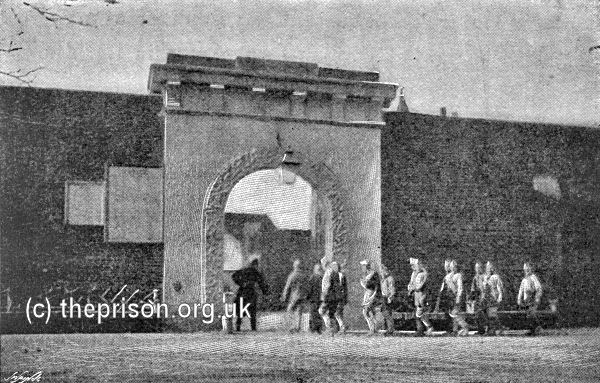Borstal Convict Prison / HMP Rochester, Rochester, Kent
Borstal Convict Prison was erected in 1871-4 on Fort Road, Borstal, ner Rochester. The initial construction work was carried out by convicts from the nearby Chatham Prison.
The prison was opened on 3rd August 1874 when 40 convicts from Chatham took up residence, one per cell, in what became known as 'A' hall. On the 3rd and 4th of September, a further 38 arrived, and on the 14th of October, the total was made up to 100 on the completion of the hall.
The gatehouse was on Fort Road at the west of the site and the prison chapel stood at its rear. The four detached cell blocks (referred to as A, B, C and D) radiated from a central area in which were located the kitchen and chapel. The blocks, housing a total of 504 cells, were single-storeyed, with brick external walls and corrugated-iron cell partitions. The cells were all occupied by 1877; the punishment cells were completed the following year; the kitchen, bakehouse and bath house were finished in 1880; the infirmary was completed in 1883-4 and the chapel was first used in July 1884. A temporary workshop for tailors and shoemakers was erected in 1880 and enlarged a year later.
In 1902, part of the prison was taken over as part of an experimental scheme for dealing with young offenders and in 1905 the whole site ceased housing adult prisoners, subsequently becoming the Borstal Institution, with 'borstals' becoming used as a generic names for the other institutions established on the same lines.
In 1983, the establishment was converted to a Youth Custody Centre. In 1988, it became a Remand Centre then had a mixed role, also acting as a holding centre for immigration detainees, a resettlement unit for adult male prisoners at the end of their sentences, and a remand and allocation centre for under 21 year old males. In 2011, the site now known as Rochester Prison, became a dual-purpose site catering for Young Offenders and adult 'Category C' offenders.

Prisoners going in to dinner at Borstal Convict Prison, c.1900. © Peter Higginbotham
Records
Note: many repositories impose a closure period of up to 100 years for records identifying individuals. Before travelling a long distance, always check that the records you want to consult will be available.
- The National Archives, Kew, Richmond, Surrey, TW9 4DU.
- The National Archives, Kew, Richmond, Surrey, TW9 4DU. Has a wide variety of crime and prison records going back to the 1770s, including calendars of prisoners, prison registers and criminal registers.
- Find My Past has digitized many of the National Archives' prison records, including prisoner-of-war records, plus a variety of local records including Manchester, York and Plymouth. More information.
- Prison-related records on
Ancestry UK
include Prison Commission Records, 1770-1951
, and local records from London, Swansea, Gloucesterhire and West Yorkshire. More information.
- The Genealogist also has a number of National Archives' prison records. More information.
Census
Bibliography
- Higginbotham, Peter The Prison Cookbook: A History of the English Prison and its Food (2010, The History Press)
- Brodie, A. Behind Bars - The Hidden Architecture of England's Prisons (2000, English Heritage)
- Brodie, A., Croom, J. & Davies, J.O. English Prisons: An Architectural History (2002, English Heritage)
- Harding, C., Hines, B., Ireland, R., Rawlings, P. Imprisonment in England and Wales (1985, Croom Helm)
- McConville, Sean A History of English Prison Administration: Volume I 1750-1877 (1981, Routledge & Kegan Paul)
- Morris, N. and Rothman, D.G. (eds.) The Oxfod History of the Prison (1997, OUP)
- Pugh R.B. Imprisonment in Medieval England (1968, CUP)
Links
- Prison Oracle - resources those involved in present-day UK prisons.
- GOV.UK - UK Government's information on sentencing, probation and support for families.
Except where indicated, this page () © Peter Higginbotham. Contents may not be reproduced without permission.



